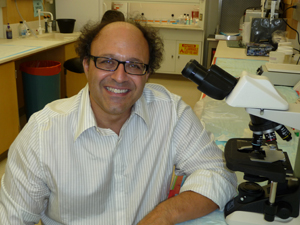 |
Howard Fox, M.D., Ph.D. |
He would take the slimy creatures home to dissect them, and when he couldn’t catch them, he bought frogs from a local hobby shop with the money he earned delivering newspapers.
And he figured he would grow up to be a doctor, just like his dad, a family physician in the small but growing community northwest of Chicago.
“I have messy handwriting,” he said, laughing, “so my teachers always said I better go to medical school.”
He did, but primary care is not quite what he ended up doing.
The untimely death of Dr. Fox’s father when he was 16 helped shaped what Dr. Fox does today as a scientist who studies neurological diseases.
The elder Dr. Fox struggled with depression, he said, and also suffered from several strokes. And there was more — later his paternal grandmother developed Alzheimer’s, and a close cousin was struck with AIDS dementia.
As the newest member of the UNMC Department of Pharmacology and Experimental Neuroscience, Dr. Fox will study ways to prevent the devastating effects of such neurological disorders as Alzheimer’s, Parkinson’s disease and HIV-induced dementia.
A recruit from The Scripps Research Institute in La Jolla, Calif., Dr. Fox joins a growing team of researchers dedicated to eliminating these deadly diseases.
“Coming to UNMC feels like coming home to me since I’m originally from the Midwest,” Dr. Fox said.
A father of three, Dr. Fox will be joined at UNMC by his wife, Nora Sarvetnick, Ph.D., who will lead transplant immunology here.
|
|
“Most people look at neuroAIDS from a viral aspect, how the virus affects the body, but I began looking at it from a brain and immune cell response to infection,” he said.
Dr. Fox began using the simian immunodeficiency virus (SIV) model in primates to study this at Scripps. SIV is the equivalent to HIV in humans.
“We were one of the first to do immune studies on how certain T cells work to control or not control the virus in the brain,” he said.
The work led Dr. Fox to wonder about the immune reaction brought on by other diseases, such as ALS, Parkinson’s and Alzheimer’s, something he plans to pursue at UNMC.
“Howard Fox is a highly respected scientific leader in the field of neurodegenerative medicine,” said Howard Gendelman, M.D., chairman of the department of pharmacology and experimental neuroscience. “Recruiting someone of his stature is immeasurable. He is extraordinarily intelligent, has the highest moral integrity for his work and complements the work our scientists are currently doing in this department.”
When Dr. Gendelman asked him to come to Nebraska, Dr. Fox said the choice was easy.
“The environment that has been developed at UNMC to study neurodegenerative disorders is among the best,” he said. “It was not only the new facilities, and state-of-the-art equipment, which of course are key components, but the people at UNMC. The scientists, their work, and the leadership are outstanding in this department and at this university.”
Dr. Fox said it is important, especially in the area of neurological disease, to involve clinicians in research. Their input is necessary to help develop new therapeutics, preventive measures and early diagnosis of this type of disease, he said.
“In the academic medical environment of UNMC, I can do more translational work,” Dr. Fox said. “I hope to develop a connection with the clinical side and work with the neurologists and psychiatrists who treat disorders of the brain.”